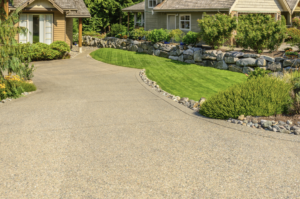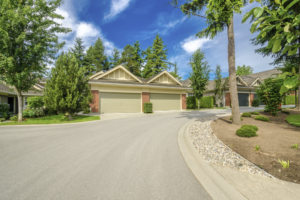Asphalt paving is a process that’s essential for building smooth, durable roads and driveways. In this article, we’ll break down the basics of how asphalt paving works. Whether you’re curious about how streets are constructed or considering a paving project, this guide will look at the process and what makes asphalt a popular choice for paving.
What are the basics of asphalt paving?
Asphalt is a widely used material in paving and is known for its versatility and durability. Two primary types of asphalt are used for different purposes: hot mix and cold mix.
Hot Mix Asphalt
This type is commonly used for constructing roads and highways. It’s prepared by heating the asphalt to around 300°F, making it pliable and easier to work with. The heat also helps the material to compact and bind together effectively, resulting in a smooth, hard surface once it cools down. Hot mix asphalt works well in high-traffic areas because of its ability to withstand heavy loads and resist weather-related wear and tear. It’s also less prone to cracking and potholes, making it a long-lasting option for busy roads.
Cold Mix Asphalt
Best suited for lower-traffic areas, cold mix asphalt is ideal for repairing potholes and patching worn pavement sections, especially in colder climates. Unlike hot mix asphalt, it doesn’t need to be heated, making it more convenient and energy-efficient for small-scale repairs. It’s a quick-fix solution for maintaining roads without extensive equipment or heat, allowing easy application even in chilly conditions.
Several benefits stand out when comparing asphalt to other paving materials like concrete or gravel. Firstly, asphalt is generally more cost-effective than concrete and can be laid down much faster, reducing labor costs and road closure times. Its flexibility helps it to resist cracking under pressure or due to temperature changes, a common issue with concrete. As for gravel, while it’s a cheaper option, asphalt provides a smoother, more stable surface. This smoothness makes for a more comfortable ride and reduces vehicle wear and tear.
What are the layers of asphalt paving?
Asphalt paving involves several layers, each with a specific thickness and purpose, to ensure the road’s durability and stability.
Subgrade Layer
The subgrade layer is at the base, typically the natural or compacted soil. It forms the foundation and is usually at least a few inches thick, depending on the soil type and the expected traffic load.
Subbase Layer
Above this is the subbase layer, composed of larger stones or gravel, providing additional support and drainage. This layer can be around 4 to 8 inches thick.
Base Layer
The next layer is the base layer of finer crushed stone or gravel. It’s crucial for load distribution and adds structural capacity, typically 4 to 6 inches thick.
Binder Layer
The binder layer sits above the base layer, a mix of larger aggregate and asphalt binder. This layer, usually about 3 to 4 inches thick, adds strength and helps distribute the load to the lower layers.
Surface Layer
The final layer is the surface layer, the topmost part of the pavement. It’s made of high-quality, small, smooth aggregate mixed with asphalt, providing a smooth driving surface and resistance to traffic wear. The surface layer is generally about 1.5 to 3 inches thick.
Sealcoat
Sometimes, a sealcoat may be applied over the surface layer. This coat, usually only a fraction of an inch thick, is a protective barrier against elements like UV rays, water, and chemicals. The thickness of each layer can vary based on factors like traffic volume, climate, and the specific requirements of the paving project. Proper design and construction of these layers are crucial to ensuring a long-lasting and safe asphalt pavement.
What should you expect when you work with a professional?
You can expect a thorough and quality job when you hire a professional for asphalt paving. The process usually starts with the professional checking out the area and planning the work. A typical driveway could take a few days to a week, but bigger projects like roads might need several weeks.
The cost depends on the size of the area, how much prep work is needed, the type of asphalt used, and where you live. Generally, you pay anywhere from $2,500 to $10,000 for a driveway, but larger projects will cost more. Professionals are great at ensuring everything is done right, like ensuring water drains properly and using the right materials for a smooth and long-lasting surface. For the most accurate information about time and cost, it’s best to talk directly with a professional who can look at your specific project.
Have more questions?
Walt’s Paving can help with your asphalt paving needs. We believe in offering quality service and have a proven track record of helping customers! If you have any further questions regarding our services, please contact us today.







